Institutional Theory and HSBC's Global Business Sustainability Report
VerifiedAdded on 2020/10/22
|13
|3621
|437
Report
AI Summary
This report examines HSBC's global business strategy and sustainability initiatives. It analyzes the bank's choice of London as its headquarters, applying institutional theory to understand the factors influencing this decision. The report explores the benefits of locating in global cities, such as access to skilled workforce, infrastructure, and networking opportunities. Furthermore, it assesses HSBC's corporate social responsibility (CSR) agenda and how its sustainability initiatives align with its global goals or are tailored to local contexts. The report highlights the importance of CSR, the pyramid of responsibilities and provides insights into HSBC's approach to sustainability, including the long-term initiatives implemented within the company. The report also emphasizes the advantages associated with locating in global cities, such as workforce, infrastructure, connections, mergers and acquisitions, brand recognition, networking opportunities, innovation, built-in culture, economic incentives, talented millennials, convenience, financing options, friendly environment, and easy access for customers. The conclusion summarizes the key findings regarding HSBC's global business and sustainability practices.
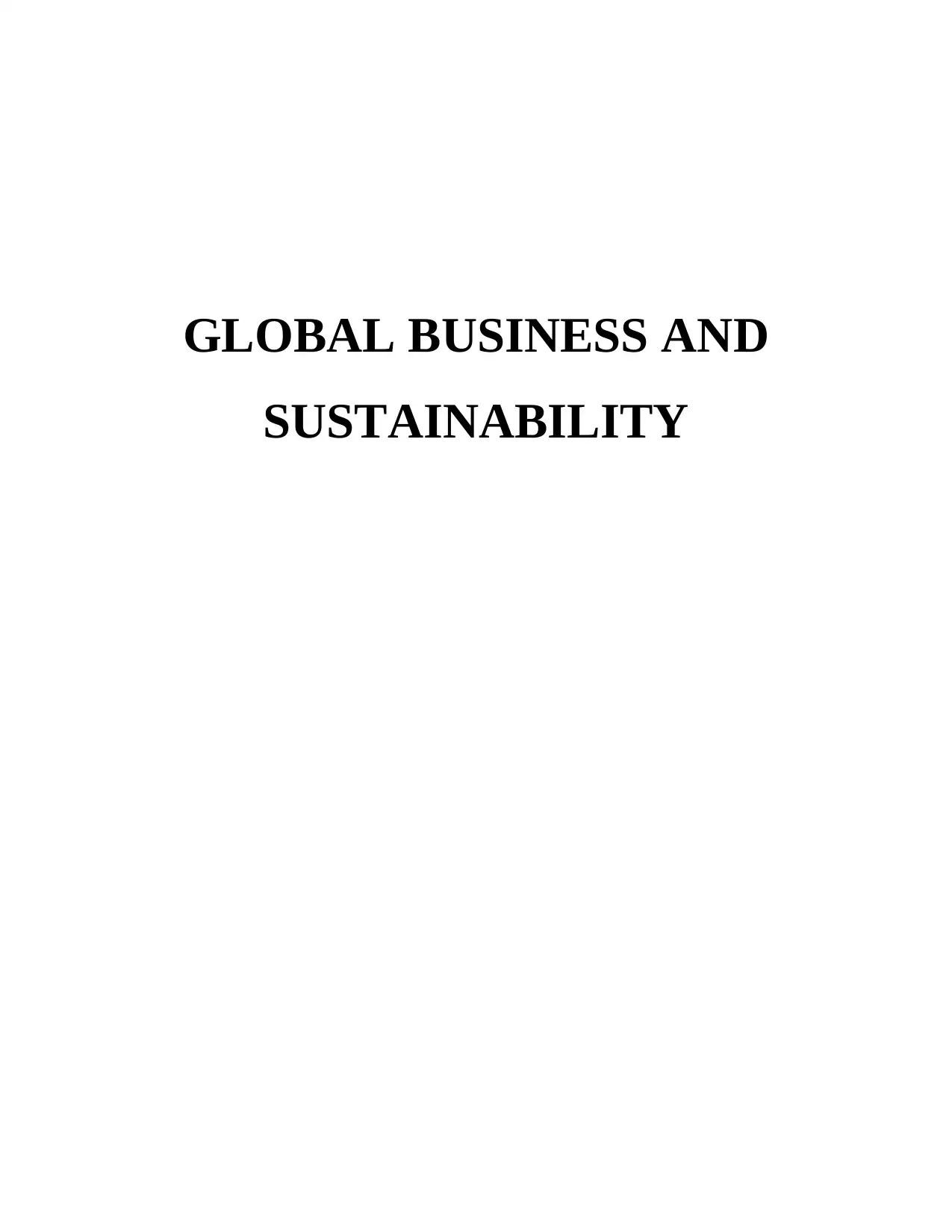
GLOBAL BUSINESS AND
SUSTAINABILITY
SUSTAINABILITY
Paraphrase This Document
Need a fresh take? Get an instant paraphrase of this document with our AI Paraphraser
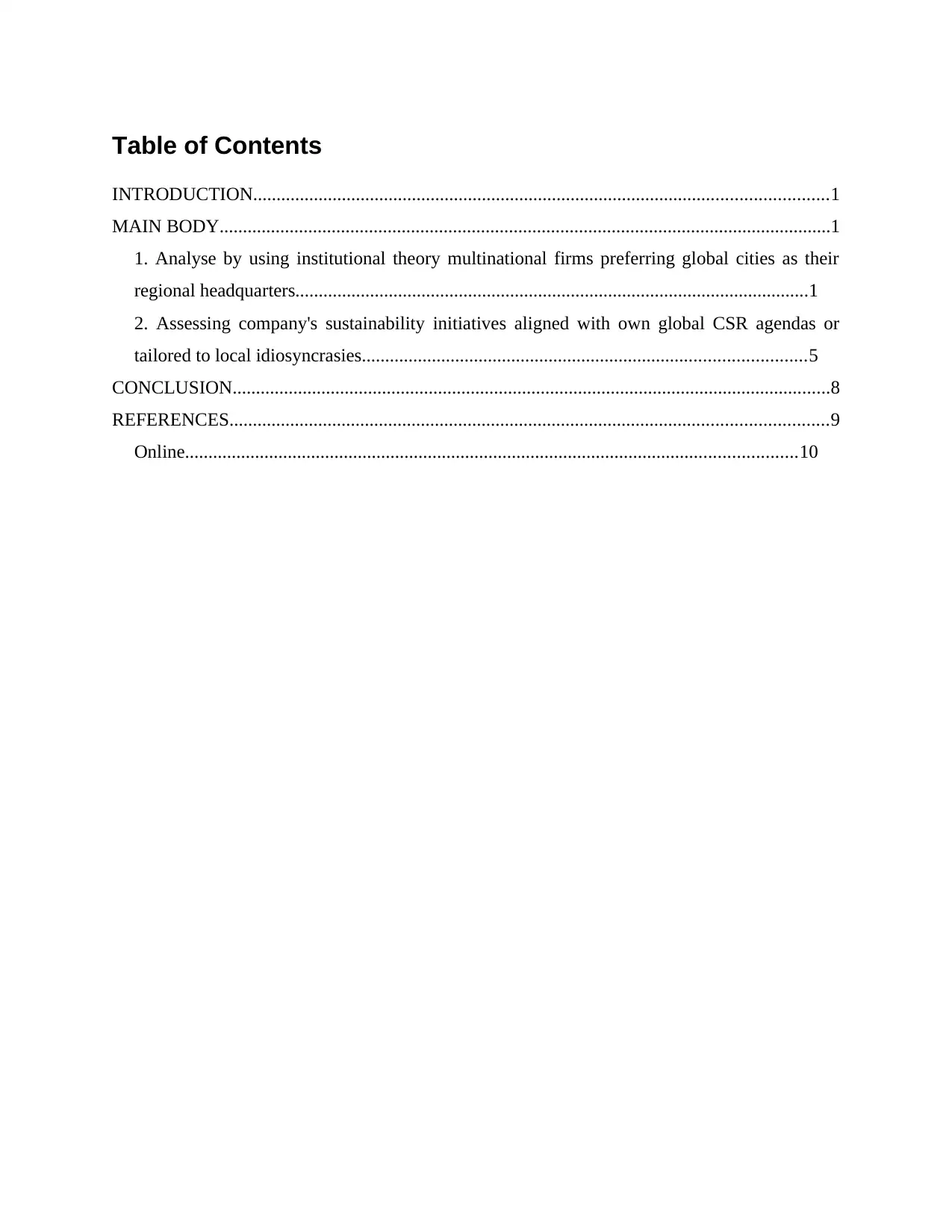
Table of Contents
INTRODUCTION...........................................................................................................................1
MAIN BODY...................................................................................................................................1
1. Analyse by using institutional theory multinational firms preferring global cities as their
regional headquarters..............................................................................................................1
2. Assessing company's sustainability initiatives aligned with own global CSR agendas or
tailored to local idiosyncrasies...............................................................................................5
CONCLUSION................................................................................................................................8
REFERENCES................................................................................................................................9
Online...................................................................................................................................10
INTRODUCTION...........................................................................................................................1
MAIN BODY...................................................................................................................................1
1. Analyse by using institutional theory multinational firms preferring global cities as their
regional headquarters..............................................................................................................1
2. Assessing company's sustainability initiatives aligned with own global CSR agendas or
tailored to local idiosyncrasies...............................................................................................5
CONCLUSION................................................................................................................................8
REFERENCES................................................................................................................................9
Online...................................................................................................................................10
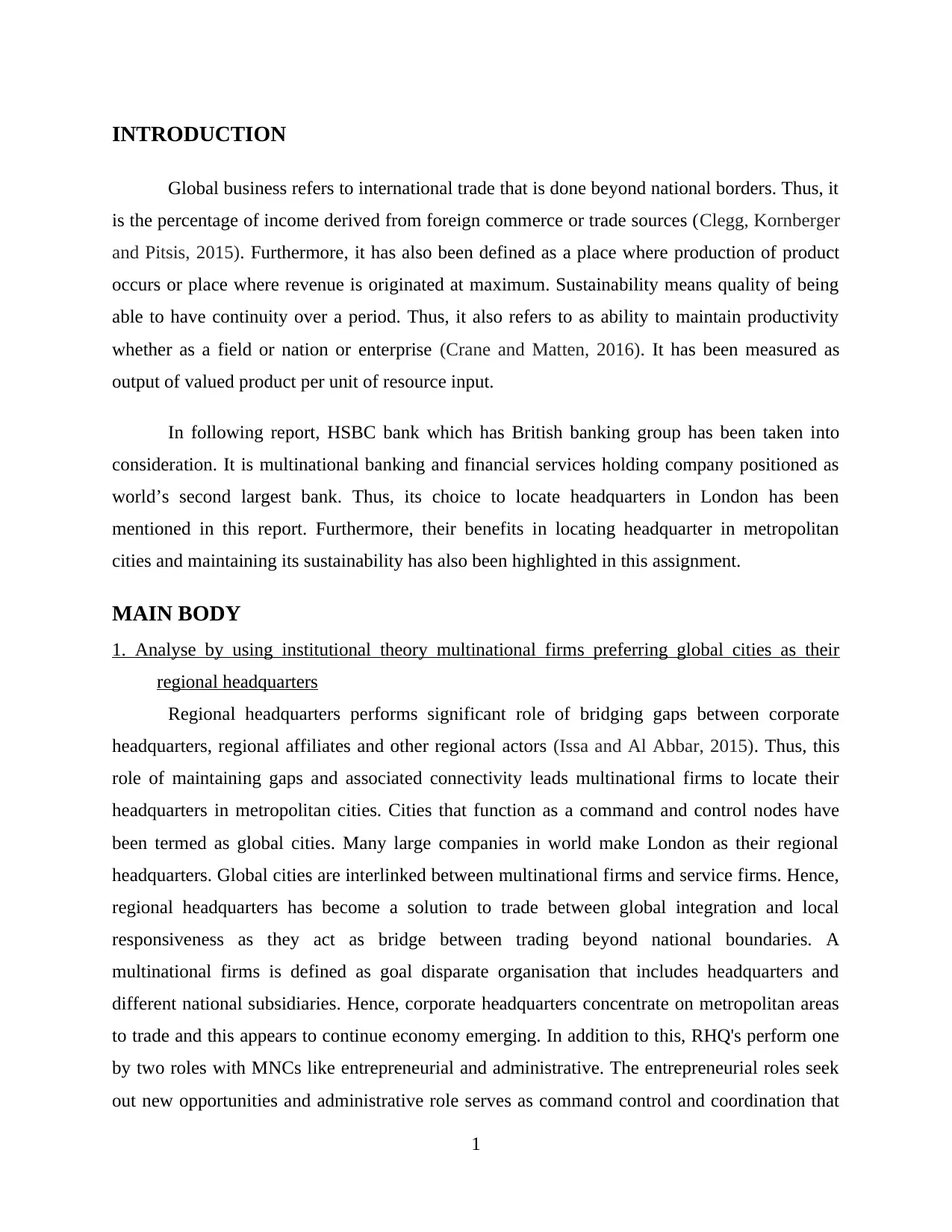
INTRODUCTION
Global business refers to international trade that is done beyond national borders. Thus, it
is the percentage of income derived from foreign commerce or trade sources (Clegg, Kornberger
and Pitsis, 2015). Furthermore, it has also been defined as a place where production of product
occurs or place where revenue is originated at maximum. Sustainability means quality of being
able to have continuity over a period. Thus, it also refers to as ability to maintain productivity
whether as a field or nation or enterprise (Crane and Matten, 2016). It has been measured as
output of valued product per unit of resource input.
In following report, HSBC bank which has British banking group has been taken into
consideration. It is multinational banking and financial services holding company positioned as
world’s second largest bank. Thus, its choice to locate headquarters in London has been
mentioned in this report. Furthermore, their benefits in locating headquarter in metropolitan
cities and maintaining its sustainability has also been highlighted in this assignment.
MAIN BODY
1. Analyse by using institutional theory multinational firms preferring global cities as their
regional headquarters
Regional headquarters performs significant role of bridging gaps between corporate
headquarters, regional affiliates and other regional actors (Issa and Al Abbar, 2015). Thus, this
role of maintaining gaps and associated connectivity leads multinational firms to locate their
headquarters in metropolitan cities. Cities that function as a command and control nodes have
been termed as global cities. Many large companies in world make London as their regional
headquarters. Global cities are interlinked between multinational firms and service firms. Hence,
regional headquarters has become a solution to trade between global integration and local
responsiveness as they act as bridge between trading beyond national boundaries. A
multinational firms is defined as goal disparate organisation that includes headquarters and
different national subsidiaries. Hence, corporate headquarters concentrate on metropolitan areas
to trade and this appears to continue economy emerging. In addition to this, RHQ's perform one
by two roles with MNCs like entrepreneurial and administrative. The entrepreneurial roles seek
out new opportunities and administrative role serves as command control and coordination that
1
Global business refers to international trade that is done beyond national borders. Thus, it
is the percentage of income derived from foreign commerce or trade sources (Clegg, Kornberger
and Pitsis, 2015). Furthermore, it has also been defined as a place where production of product
occurs or place where revenue is originated at maximum. Sustainability means quality of being
able to have continuity over a period. Thus, it also refers to as ability to maintain productivity
whether as a field or nation or enterprise (Crane and Matten, 2016). It has been measured as
output of valued product per unit of resource input.
In following report, HSBC bank which has British banking group has been taken into
consideration. It is multinational banking and financial services holding company positioned as
world’s second largest bank. Thus, its choice to locate headquarters in London has been
mentioned in this report. Furthermore, their benefits in locating headquarter in metropolitan
cities and maintaining its sustainability has also been highlighted in this assignment.
MAIN BODY
1. Analyse by using institutional theory multinational firms preferring global cities as their
regional headquarters
Regional headquarters performs significant role of bridging gaps between corporate
headquarters, regional affiliates and other regional actors (Issa and Al Abbar, 2015). Thus, this
role of maintaining gaps and associated connectivity leads multinational firms to locate their
headquarters in metropolitan cities. Cities that function as a command and control nodes have
been termed as global cities. Many large companies in world make London as their regional
headquarters. Global cities are interlinked between multinational firms and service firms. Hence,
regional headquarters has become a solution to trade between global integration and local
responsiveness as they act as bridge between trading beyond national boundaries. A
multinational firms is defined as goal disparate organisation that includes headquarters and
different national subsidiaries. Hence, corporate headquarters concentrate on metropolitan areas
to trade and this appears to continue economy emerging. In addition to this, RHQ's perform one
by two roles with MNCs like entrepreneurial and administrative. The entrepreneurial roles seek
out new opportunities and administrative role serves as command control and coordination that
1
⊘ This is a preview!⊘
Do you want full access?
Subscribe today to unlock all pages.

Trusted by 1+ million students worldwide
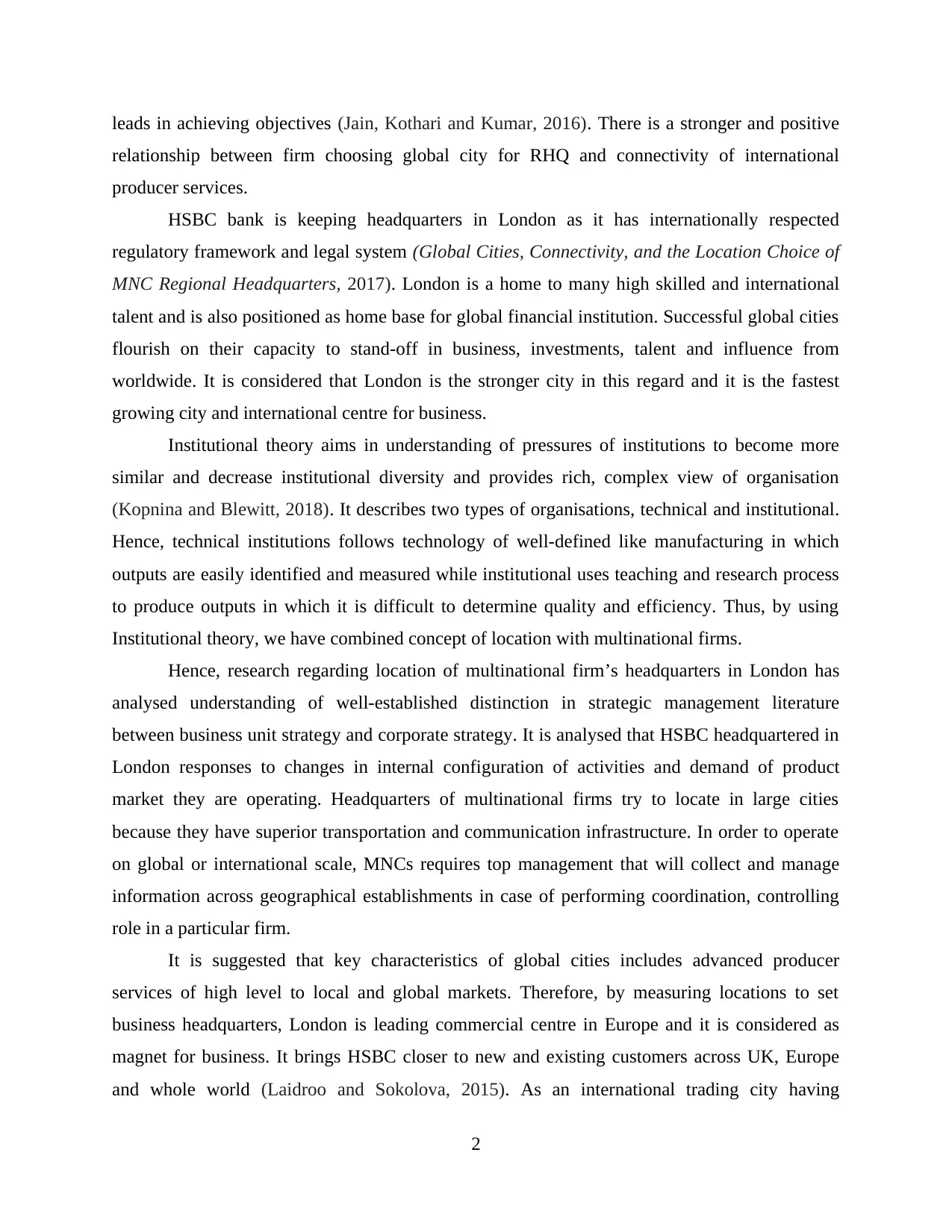
leads in achieving objectives (Jain, Kothari and Kumar, 2016). There is a stronger and positive
relationship between firm choosing global city for RHQ and connectivity of international
producer services.
HSBC bank is keeping headquarters in London as it has internationally respected
regulatory framework and legal system (Global Cities, Connectivity, and the Location Choice of
MNC Regional Headquarters, 2017). London is a home to many high skilled and international
talent and is also positioned as home base for global financial institution. Successful global cities
flourish on their capacity to stand-off in business, investments, talent and influence from
worldwide. It is considered that London is the stronger city in this regard and it is the fastest
growing city and international centre for business.
Institutional theory aims in understanding of pressures of institutions to become more
similar and decrease institutional diversity and provides rich, complex view of organisation
(Kopnina and Blewitt, 2018). It describes two types of organisations, technical and institutional.
Hence, technical institutions follows technology of well-defined like manufacturing in which
outputs are easily identified and measured while institutional uses teaching and research process
to produce outputs in which it is difficult to determine quality and efficiency. Thus, by using
Institutional theory, we have combined concept of location with multinational firms.
Hence, research regarding location of multinational firm’s headquarters in London has
analysed understanding of well-established distinction in strategic management literature
between business unit strategy and corporate strategy. It is analysed that HSBC headquartered in
London responses to changes in internal configuration of activities and demand of product
market they are operating. Headquarters of multinational firms try to locate in large cities
because they have superior transportation and communication infrastructure. In order to operate
on global or international scale, MNCs requires top management that will collect and manage
information across geographical establishments in case of performing coordination, controlling
role in a particular firm.
It is suggested that key characteristics of global cities includes advanced producer
services of high level to local and global markets. Therefore, by measuring locations to set
business headquarters, London is leading commercial centre in Europe and it is considered as
magnet for business. It brings HSBC closer to new and existing customers across UK, Europe
and whole world (Laidroo and Sokolova, 2015). As an international trading city having
2
relationship between firm choosing global city for RHQ and connectivity of international
producer services.
HSBC bank is keeping headquarters in London as it has internationally respected
regulatory framework and legal system (Global Cities, Connectivity, and the Location Choice of
MNC Regional Headquarters, 2017). London is a home to many high skilled and international
talent and is also positioned as home base for global financial institution. Successful global cities
flourish on their capacity to stand-off in business, investments, talent and influence from
worldwide. It is considered that London is the stronger city in this regard and it is the fastest
growing city and international centre for business.
Institutional theory aims in understanding of pressures of institutions to become more
similar and decrease institutional diversity and provides rich, complex view of organisation
(Kopnina and Blewitt, 2018). It describes two types of organisations, technical and institutional.
Hence, technical institutions follows technology of well-defined like manufacturing in which
outputs are easily identified and measured while institutional uses teaching and research process
to produce outputs in which it is difficult to determine quality and efficiency. Thus, by using
Institutional theory, we have combined concept of location with multinational firms.
Hence, research regarding location of multinational firm’s headquarters in London has
analysed understanding of well-established distinction in strategic management literature
between business unit strategy and corporate strategy. It is analysed that HSBC headquartered in
London responses to changes in internal configuration of activities and demand of product
market they are operating. Headquarters of multinational firms try to locate in large cities
because they have superior transportation and communication infrastructure. In order to operate
on global or international scale, MNCs requires top management that will collect and manage
information across geographical establishments in case of performing coordination, controlling
role in a particular firm.
It is suggested that key characteristics of global cities includes advanced producer
services of high level to local and global markets. Therefore, by measuring locations to set
business headquarters, London is leading commercial centre in Europe and it is considered as
magnet for business. It brings HSBC closer to new and existing customers across UK, Europe
and whole world (Laidroo and Sokolova, 2015). As an international trading city having
2
Paraphrase This Document
Need a fresh take? Get an instant paraphrase of this document with our AI Paraphraser
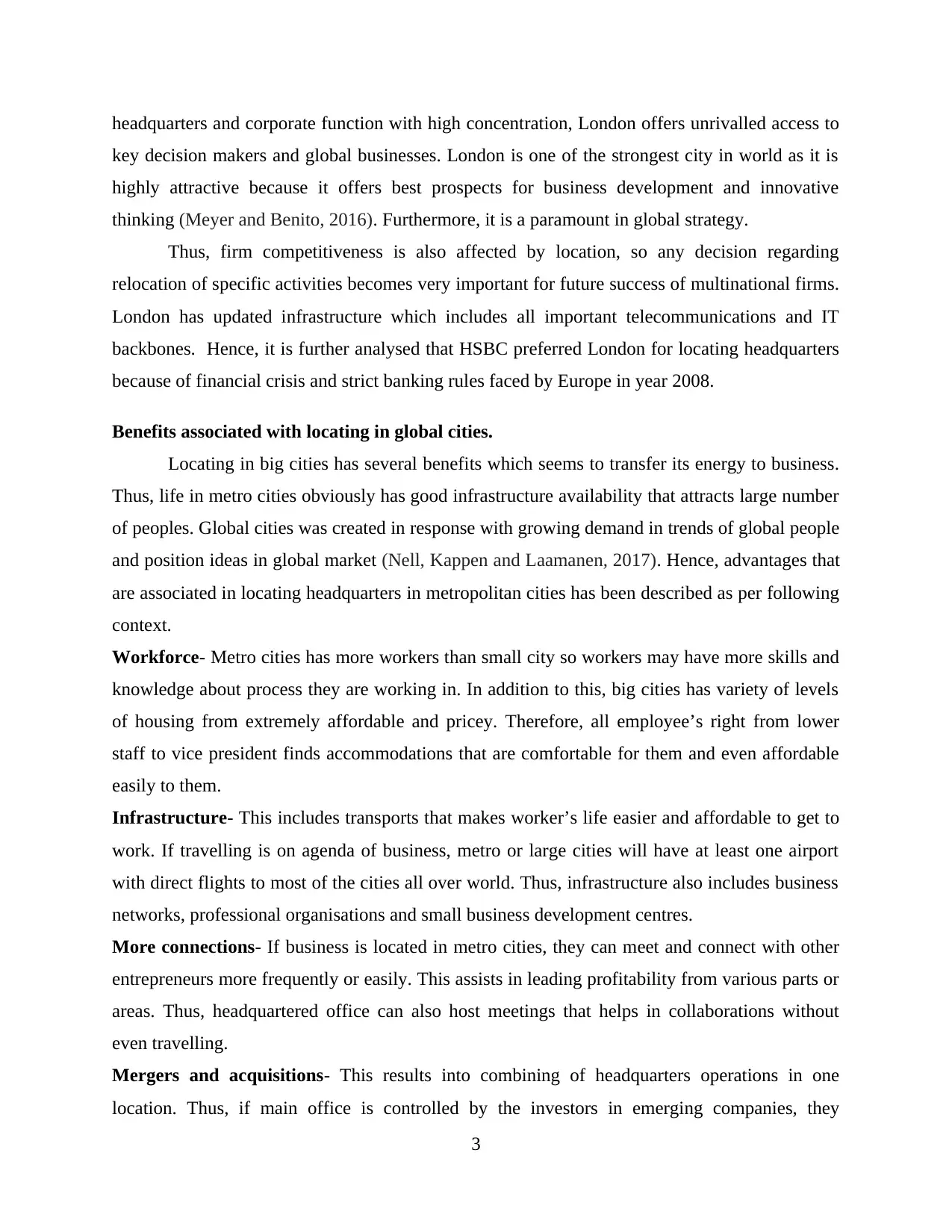
headquarters and corporate function with high concentration, London offers unrivalled access to
key decision makers and global businesses. London is one of the strongest city in world as it is
highly attractive because it offers best prospects for business development and innovative
thinking (Meyer and Benito, 2016). Furthermore, it is a paramount in global strategy.
Thus, firm competitiveness is also affected by location, so any decision regarding
relocation of specific activities becomes very important for future success of multinational firms.
London has updated infrastructure which includes all important telecommunications and IT
backbones. Hence, it is further analysed that HSBC preferred London for locating headquarters
because of financial crisis and strict banking rules faced by Europe in year 2008.
Benefits associated with locating in global cities.
Locating in big cities has several benefits which seems to transfer its energy to business.
Thus, life in metro cities obviously has good infrastructure availability that attracts large number
of peoples. Global cities was created in response with growing demand in trends of global people
and position ideas in global market (Nell, Kappen and Laamanen, 2017). Hence, advantages that
are associated in locating headquarters in metropolitan cities has been described as per following
context.
Workforce- Metro cities has more workers than small city so workers may have more skills and
knowledge about process they are working in. In addition to this, big cities has variety of levels
of housing from extremely affordable and pricey. Therefore, all employee’s right from lower
staff to vice president finds accommodations that are comfortable for them and even affordable
easily to them.
Infrastructure- This includes transports that makes worker’s life easier and affordable to get to
work. If travelling is on agenda of business, metro or large cities will have at least one airport
with direct flights to most of the cities all over world. Thus, infrastructure also includes business
networks, professional organisations and small business development centres.
More connections- If business is located in metro cities, they can meet and connect with other
entrepreneurs more frequently or easily. This assists in leading profitability from various parts or
areas. Thus, headquartered office can also host meetings that helps in collaborations without
even travelling.
Mergers and acquisitions- This results into combining of headquarters operations in one
location. Thus, if main office is controlled by the investors in emerging companies, they
3
key decision makers and global businesses. London is one of the strongest city in world as it is
highly attractive because it offers best prospects for business development and innovative
thinking (Meyer and Benito, 2016). Furthermore, it is a paramount in global strategy.
Thus, firm competitiveness is also affected by location, so any decision regarding
relocation of specific activities becomes very important for future success of multinational firms.
London has updated infrastructure which includes all important telecommunications and IT
backbones. Hence, it is further analysed that HSBC preferred London for locating headquarters
because of financial crisis and strict banking rules faced by Europe in year 2008.
Benefits associated with locating in global cities.
Locating in big cities has several benefits which seems to transfer its energy to business.
Thus, life in metro cities obviously has good infrastructure availability that attracts large number
of peoples. Global cities was created in response with growing demand in trends of global people
and position ideas in global market (Nell, Kappen and Laamanen, 2017). Hence, advantages that
are associated in locating headquarters in metropolitan cities has been described as per following
context.
Workforce- Metro cities has more workers than small city so workers may have more skills and
knowledge about process they are working in. In addition to this, big cities has variety of levels
of housing from extremely affordable and pricey. Therefore, all employee’s right from lower
staff to vice president finds accommodations that are comfortable for them and even affordable
easily to them.
Infrastructure- This includes transports that makes worker’s life easier and affordable to get to
work. If travelling is on agenda of business, metro or large cities will have at least one airport
with direct flights to most of the cities all over world. Thus, infrastructure also includes business
networks, professional organisations and small business development centres.
More connections- If business is located in metro cities, they can meet and connect with other
entrepreneurs more frequently or easily. This assists in leading profitability from various parts or
areas. Thus, headquartered office can also host meetings that helps in collaborations without
even travelling.
Mergers and acquisitions- This results into combining of headquarters operations in one
location. Thus, if main office is controlled by the investors in emerging companies, they
3
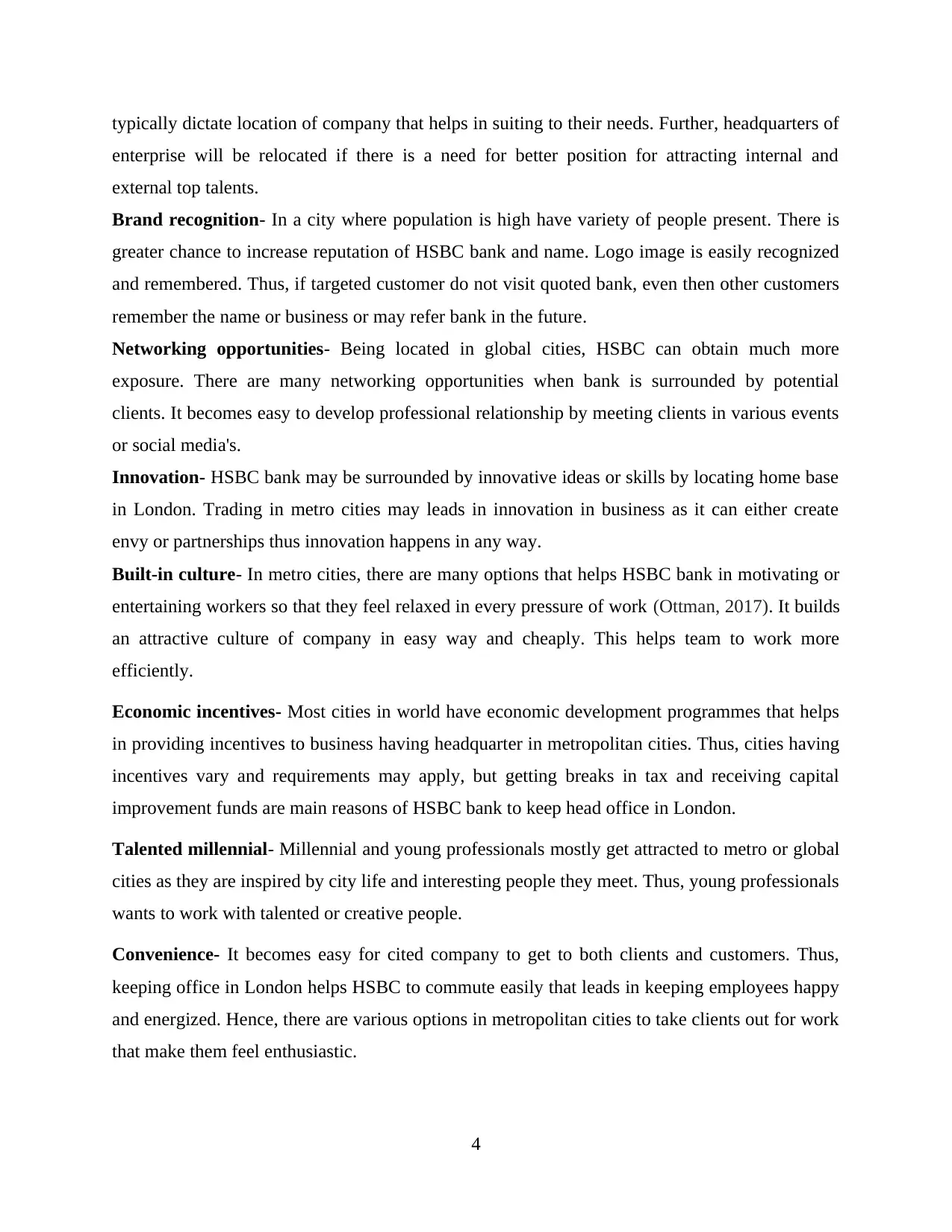
typically dictate location of company that helps in suiting to their needs. Further, headquarters of
enterprise will be relocated if there is a need for better position for attracting internal and
external top talents.
Brand recognition- In a city where population is high have variety of people present. There is
greater chance to increase reputation of HSBC bank and name. Logo image is easily recognized
and remembered. Thus, if targeted customer do not visit quoted bank, even then other customers
remember the name or business or may refer bank in the future.
Networking opportunities- Being located in global cities, HSBC can obtain much more
exposure. There are many networking opportunities when bank is surrounded by potential
clients. It becomes easy to develop professional relationship by meeting clients in various events
or social media's.
Innovation- HSBC bank may be surrounded by innovative ideas or skills by locating home base
in London. Trading in metro cities may leads in innovation in business as it can either create
envy or partnerships thus innovation happens in any way.
Built-in culture- In metro cities, there are many options that helps HSBC bank in motivating or
entertaining workers so that they feel relaxed in every pressure of work (Ottman, 2017). It builds
an attractive culture of company in easy way and cheaply. This helps team to work more
efficiently.
Economic incentives- Most cities in world have economic development programmes that helps
in providing incentives to business having headquarter in metropolitan cities. Thus, cities having
incentives vary and requirements may apply, but getting breaks in tax and receiving capital
improvement funds are main reasons of HSBC bank to keep head office in London.
Talented millennial- Millennial and young professionals mostly get attracted to metro or global
cities as they are inspired by city life and interesting people they meet. Thus, young professionals
wants to work with talented or creative people.
Convenience- It becomes easy for cited company to get to both clients and customers. Thus,
keeping office in London helps HSBC to commute easily that leads in keeping employees happy
and energized. Hence, there are various options in metropolitan cities to take clients out for work
that make them feel enthusiastic.
4
enterprise will be relocated if there is a need for better position for attracting internal and
external top talents.
Brand recognition- In a city where population is high have variety of people present. There is
greater chance to increase reputation of HSBC bank and name. Logo image is easily recognized
and remembered. Thus, if targeted customer do not visit quoted bank, even then other customers
remember the name or business or may refer bank in the future.
Networking opportunities- Being located in global cities, HSBC can obtain much more
exposure. There are many networking opportunities when bank is surrounded by potential
clients. It becomes easy to develop professional relationship by meeting clients in various events
or social media's.
Innovation- HSBC bank may be surrounded by innovative ideas or skills by locating home base
in London. Trading in metro cities may leads in innovation in business as it can either create
envy or partnerships thus innovation happens in any way.
Built-in culture- In metro cities, there are many options that helps HSBC bank in motivating or
entertaining workers so that they feel relaxed in every pressure of work (Ottman, 2017). It builds
an attractive culture of company in easy way and cheaply. This helps team to work more
efficiently.
Economic incentives- Most cities in world have economic development programmes that helps
in providing incentives to business having headquarter in metropolitan cities. Thus, cities having
incentives vary and requirements may apply, but getting breaks in tax and receiving capital
improvement funds are main reasons of HSBC bank to keep head office in London.
Talented millennial- Millennial and young professionals mostly get attracted to metro or global
cities as they are inspired by city life and interesting people they meet. Thus, young professionals
wants to work with talented or creative people.
Convenience- It becomes easy for cited company to get to both clients and customers. Thus,
keeping office in London helps HSBC to commute easily that leads in keeping employees happy
and energized. Hence, there are various options in metropolitan cities to take clients out for work
that make them feel enthusiastic.
4
⊘ This is a preview!⊘
Do you want full access?
Subscribe today to unlock all pages.

Trusted by 1+ million students worldwide
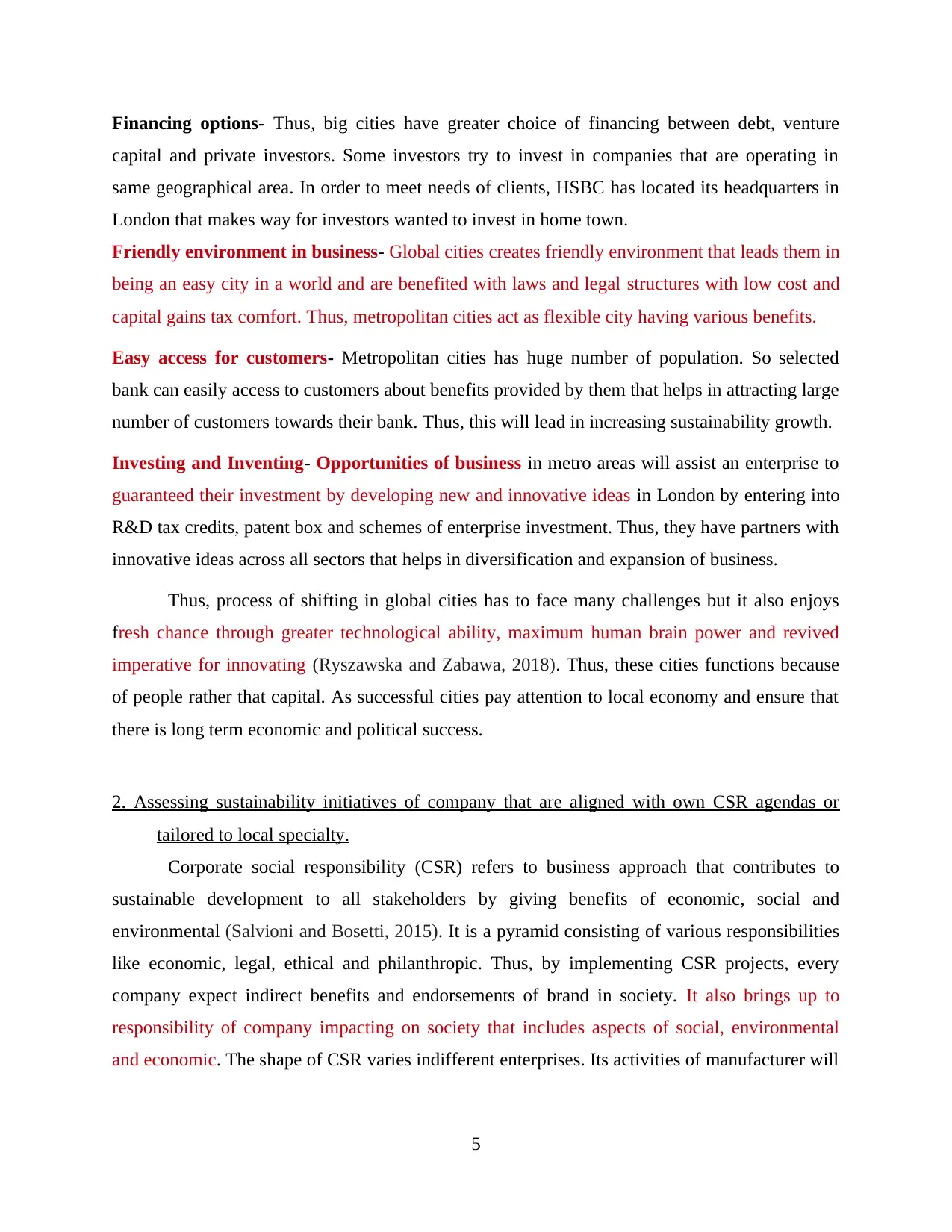
Financing options- Thus, big cities have greater choice of financing between debt, venture
capital and private investors. Some investors try to invest in companies that are operating in
same geographical area. In order to meet needs of clients, HSBC has located its headquarters in
London that makes way for investors wanted to invest in home town.
Friendly environment in business- Global cities creates friendly environment that leads them in
being an easy city in a world and are benefited with laws and legal structures with low cost and
capital gains tax comfort. Thus, metropolitan cities act as flexible city having various benefits.
Easy access for customers- Metropolitan cities has huge number of population. So selected
bank can easily access to customers about benefits provided by them that helps in attracting large
number of customers towards their bank. Thus, this will lead in increasing sustainability growth.
Investing and Inventing- Opportunities of business in metro areas will assist an enterprise to
guaranteed their investment by developing new and innovative ideas in London by entering into
R&D tax credits, patent box and schemes of enterprise investment. Thus, they have partners with
innovative ideas across all sectors that helps in diversification and expansion of business.
Thus, process of shifting in global cities has to face many challenges but it also enjoys
fresh chance through greater technological ability, maximum human brain power and revived
imperative for innovating (Ryszawska and Zabawa, 2018). Thus, these cities functions because
of people rather that capital. As successful cities pay attention to local economy and ensure that
there is long term economic and political success.
2. Assessing sustainability initiatives of company that are aligned with own CSR agendas or
tailored to local specialty.
Corporate social responsibility (CSR) refers to business approach that contributes to
sustainable development to all stakeholders by giving benefits of economic, social and
environmental (Salvioni and Bosetti, 2015). It is a pyramid consisting of various responsibilities
like economic, legal, ethical and philanthropic. Thus, by implementing CSR projects, every
company expect indirect benefits and endorsements of brand in society. It also brings up to
responsibility of company impacting on society that includes aspects of social, environmental
and economic. The shape of CSR varies indifferent enterprises. Its activities of manufacturer will
5
capital and private investors. Some investors try to invest in companies that are operating in
same geographical area. In order to meet needs of clients, HSBC has located its headquarters in
London that makes way for investors wanted to invest in home town.
Friendly environment in business- Global cities creates friendly environment that leads them in
being an easy city in a world and are benefited with laws and legal structures with low cost and
capital gains tax comfort. Thus, metropolitan cities act as flexible city having various benefits.
Easy access for customers- Metropolitan cities has huge number of population. So selected
bank can easily access to customers about benefits provided by them that helps in attracting large
number of customers towards their bank. Thus, this will lead in increasing sustainability growth.
Investing and Inventing- Opportunities of business in metro areas will assist an enterprise to
guaranteed their investment by developing new and innovative ideas in London by entering into
R&D tax credits, patent box and schemes of enterprise investment. Thus, they have partners with
innovative ideas across all sectors that helps in diversification and expansion of business.
Thus, process of shifting in global cities has to face many challenges but it also enjoys
fresh chance through greater technological ability, maximum human brain power and revived
imperative for innovating (Ryszawska and Zabawa, 2018). Thus, these cities functions because
of people rather that capital. As successful cities pay attention to local economy and ensure that
there is long term economic and political success.
2. Assessing sustainability initiatives of company that are aligned with own CSR agendas or
tailored to local specialty.
Corporate social responsibility (CSR) refers to business approach that contributes to
sustainable development to all stakeholders by giving benefits of economic, social and
environmental (Salvioni and Bosetti, 2015). It is a pyramid consisting of various responsibilities
like economic, legal, ethical and philanthropic. Thus, by implementing CSR projects, every
company expect indirect benefits and endorsements of brand in society. It also brings up to
responsibility of company impacting on society that includes aspects of social, environmental
and economic. The shape of CSR varies indifferent enterprises. Its activities of manufacturer will
5
Paraphrase This Document
Need a fresh take? Get an instant paraphrase of this document with our AI Paraphraser
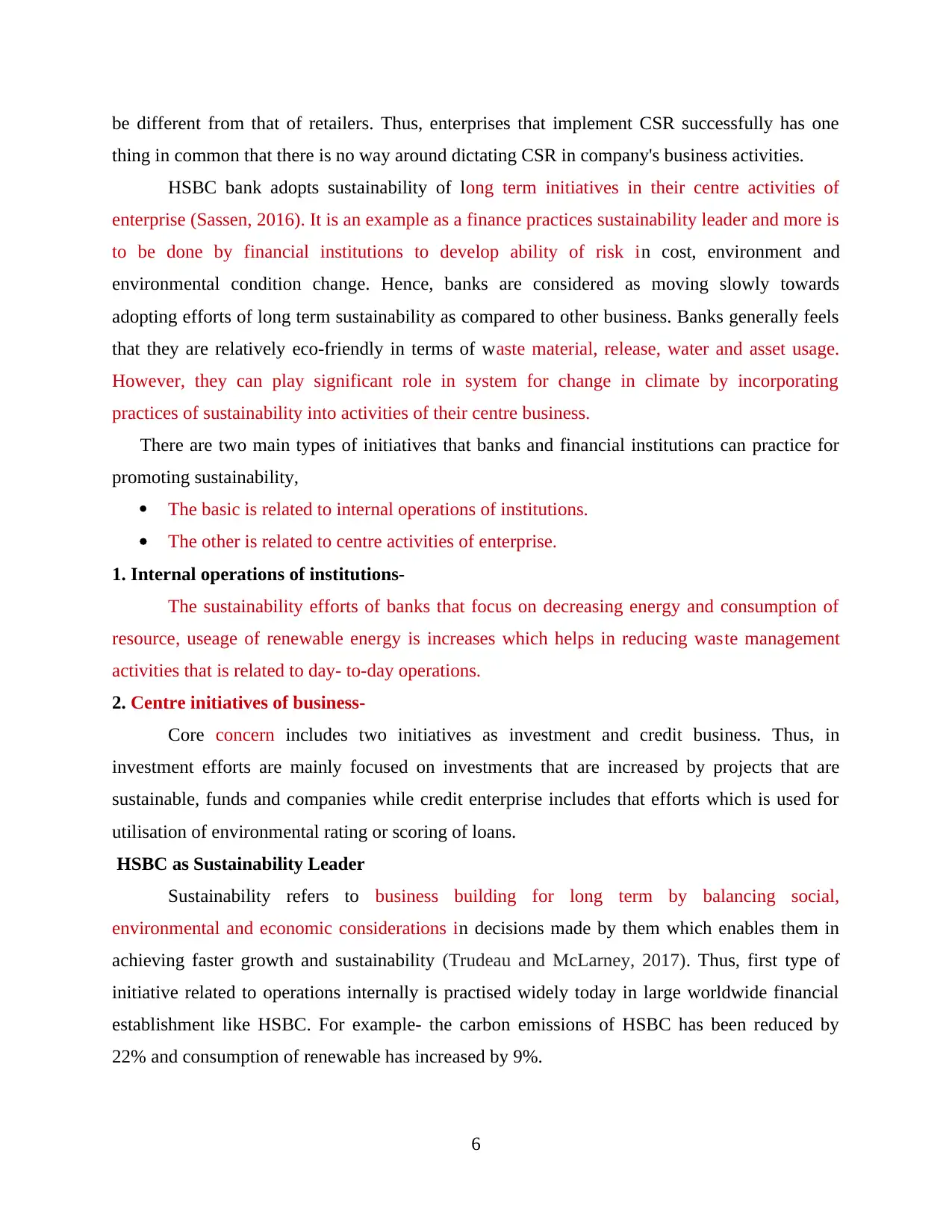
be different from that of retailers. Thus, enterprises that implement CSR successfully has one
thing in common that there is no way around dictating CSR in company's business activities.
HSBC bank adopts sustainability of long term initiatives in their centre activities of
enterprise (Sassen, 2016). It is an example as a finance practices sustainability leader and more is
to be done by financial institutions to develop ability of risk in cost, environment and
environmental condition change. Hence, banks are considered as moving slowly towards
adopting efforts of long term sustainability as compared to other business. Banks generally feels
that they are relatively eco-friendly in terms of waste material, release, water and asset usage.
However, they can play significant role in system for change in climate by incorporating
practices of sustainability into activities of their centre business.
There are two main types of initiatives that banks and financial institutions can practice for
promoting sustainability,
The basic is related to internal operations of institutions.
The other is related to centre activities of enterprise.
1. Internal operations of institutions-
The sustainability efforts of banks that focus on decreasing energy and consumption of
resource, useage of renewable energy is increases which helps in reducing waste management
activities that is related to day- to-day operations.
2. Centre initiatives of business-
Core concern includes two initiatives as investment and credit business. Thus, in
investment efforts are mainly focused on investments that are increased by projects that are
sustainable, funds and companies while credit enterprise includes that efforts which is used for
utilisation of environmental rating or scoring of loans.
HSBC as Sustainability Leader
Sustainability refers to business building for long term by balancing social,
environmental and economic considerations in decisions made by them which enables them in
achieving faster growth and sustainability (Trudeau and McLarney, 2017). Thus, first type of
initiative related to operations internally is practised widely today in large worldwide financial
establishment like HSBC. For example- the carbon emissions of HSBC has been reduced by
22% and consumption of renewable has increased by 9%.
6
thing in common that there is no way around dictating CSR in company's business activities.
HSBC bank adopts sustainability of long term initiatives in their centre activities of
enterprise (Sassen, 2016). It is an example as a finance practices sustainability leader and more is
to be done by financial institutions to develop ability of risk in cost, environment and
environmental condition change. Hence, banks are considered as moving slowly towards
adopting efforts of long term sustainability as compared to other business. Banks generally feels
that they are relatively eco-friendly in terms of waste material, release, water and asset usage.
However, they can play significant role in system for change in climate by incorporating
practices of sustainability into activities of their centre business.
There are two main types of initiatives that banks and financial institutions can practice for
promoting sustainability,
The basic is related to internal operations of institutions.
The other is related to centre activities of enterprise.
1. Internal operations of institutions-
The sustainability efforts of banks that focus on decreasing energy and consumption of
resource, useage of renewable energy is increases which helps in reducing waste management
activities that is related to day- to-day operations.
2. Centre initiatives of business-
Core concern includes two initiatives as investment and credit business. Thus, in
investment efforts are mainly focused on investments that are increased by projects that are
sustainable, funds and companies while credit enterprise includes that efforts which is used for
utilisation of environmental rating or scoring of loans.
HSBC as Sustainability Leader
Sustainability refers to business building for long term by balancing social,
environmental and economic considerations in decisions made by them which enables them in
achieving faster growth and sustainability (Trudeau and McLarney, 2017). Thus, first type of
initiative related to operations internally is practised widely today in large worldwide financial
establishment like HSBC. For example- the carbon emissions of HSBC has been reduced by
22% and consumption of renewable has increased by 9%.
6
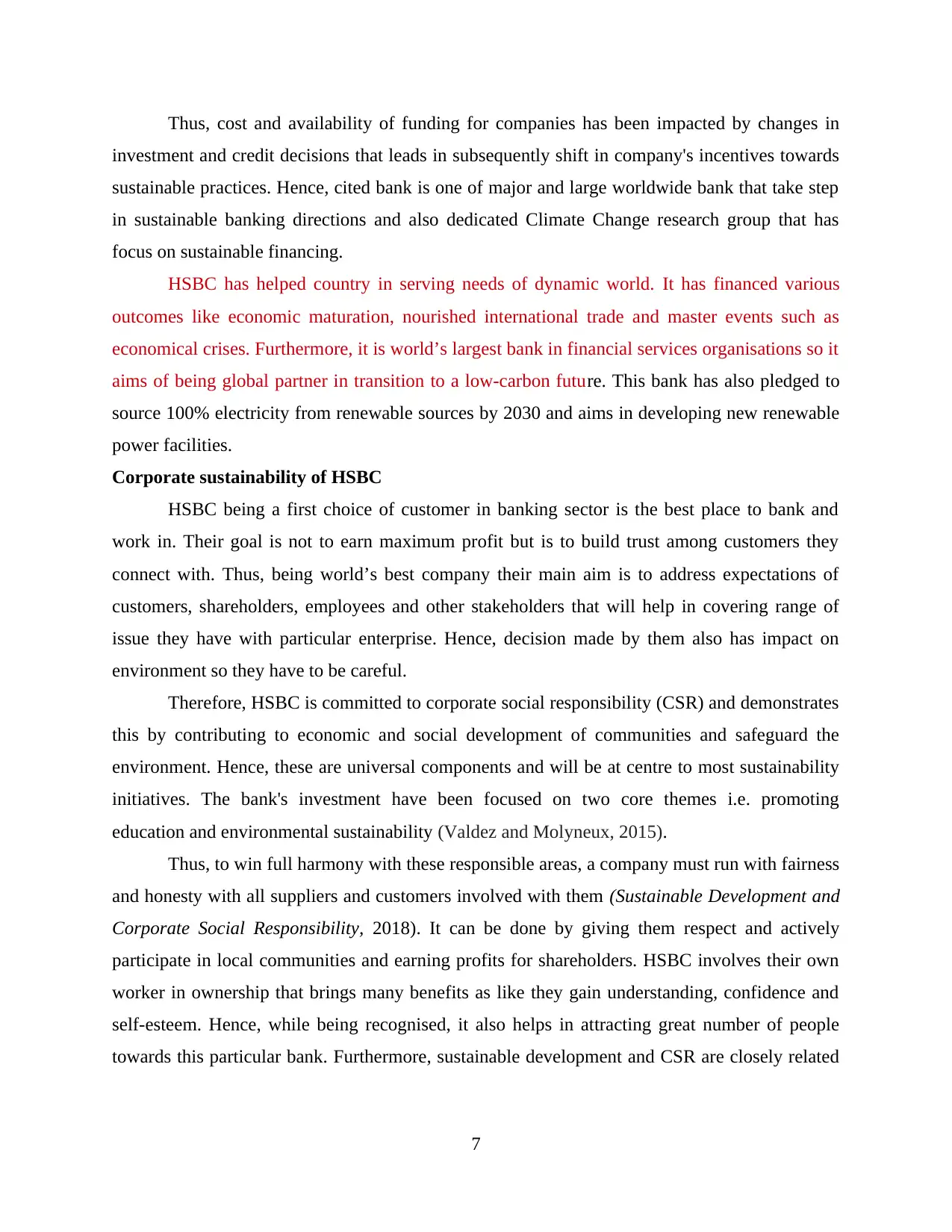
Thus, cost and availability of funding for companies has been impacted by changes in
investment and credit decisions that leads in subsequently shift in company's incentives towards
sustainable practices. Hence, cited bank is one of major and large worldwide bank that take step
in sustainable banking directions and also dedicated Climate Change research group that has
focus on sustainable financing.
HSBC has helped country in serving needs of dynamic world. It has financed various
outcomes like economic maturation, nourished international trade and master events such as
economical crises. Furthermore, it is world’s largest bank in financial services organisations so it
aims of being global partner in transition to a low-carbon future. This bank has also pledged to
source 100% electricity from renewable sources by 2030 and aims in developing new renewable
power facilities.
Corporate sustainability of HSBC
HSBC being a first choice of customer in banking sector is the best place to bank and
work in. Their goal is not to earn maximum profit but is to build trust among customers they
connect with. Thus, being world’s best company their main aim is to address expectations of
customers, shareholders, employees and other stakeholders that will help in covering range of
issue they have with particular enterprise. Hence, decision made by them also has impact on
environment so they have to be careful.
Therefore, HSBC is committed to corporate social responsibility (CSR) and demonstrates
this by contributing to economic and social development of communities and safeguard the
environment. Hence, these are universal components and will be at centre to most sustainability
initiatives. The bank's investment have been focused on two core themes i.e. promoting
education and environmental sustainability (Valdez and Molyneux, 2015).
Thus, to win full harmony with these responsible areas, a company must run with fairness
and honesty with all suppliers and customers involved with them (Sustainable Development and
Corporate Social Responsibility, 2018). It can be done by giving them respect and actively
participate in local communities and earning profits for shareholders. HSBC involves their own
worker in ownership that brings many benefits as like they gain understanding, confidence and
self-esteem. Hence, while being recognised, it also helps in attracting great number of people
towards this particular bank. Furthermore, sustainable development and CSR are closely related
7
investment and credit decisions that leads in subsequently shift in company's incentives towards
sustainable practices. Hence, cited bank is one of major and large worldwide bank that take step
in sustainable banking directions and also dedicated Climate Change research group that has
focus on sustainable financing.
HSBC has helped country in serving needs of dynamic world. It has financed various
outcomes like economic maturation, nourished international trade and master events such as
economical crises. Furthermore, it is world’s largest bank in financial services organisations so it
aims of being global partner in transition to a low-carbon future. This bank has also pledged to
source 100% electricity from renewable sources by 2030 and aims in developing new renewable
power facilities.
Corporate sustainability of HSBC
HSBC being a first choice of customer in banking sector is the best place to bank and
work in. Their goal is not to earn maximum profit but is to build trust among customers they
connect with. Thus, being world’s best company their main aim is to address expectations of
customers, shareholders, employees and other stakeholders that will help in covering range of
issue they have with particular enterprise. Hence, decision made by them also has impact on
environment so they have to be careful.
Therefore, HSBC is committed to corporate social responsibility (CSR) and demonstrates
this by contributing to economic and social development of communities and safeguard the
environment. Hence, these are universal components and will be at centre to most sustainability
initiatives. The bank's investment have been focused on two core themes i.e. promoting
education and environmental sustainability (Valdez and Molyneux, 2015).
Thus, to win full harmony with these responsible areas, a company must run with fairness
and honesty with all suppliers and customers involved with them (Sustainable Development and
Corporate Social Responsibility, 2018). It can be done by giving them respect and actively
participate in local communities and earning profits for shareholders. HSBC involves their own
worker in ownership that brings many benefits as like they gain understanding, confidence and
self-esteem. Hence, while being recognised, it also helps in attracting great number of people
towards this particular bank. Furthermore, sustainable development and CSR are closely related
7
⊘ This is a preview!⊘
Do you want full access?
Subscribe today to unlock all pages.

Trusted by 1+ million students worldwide
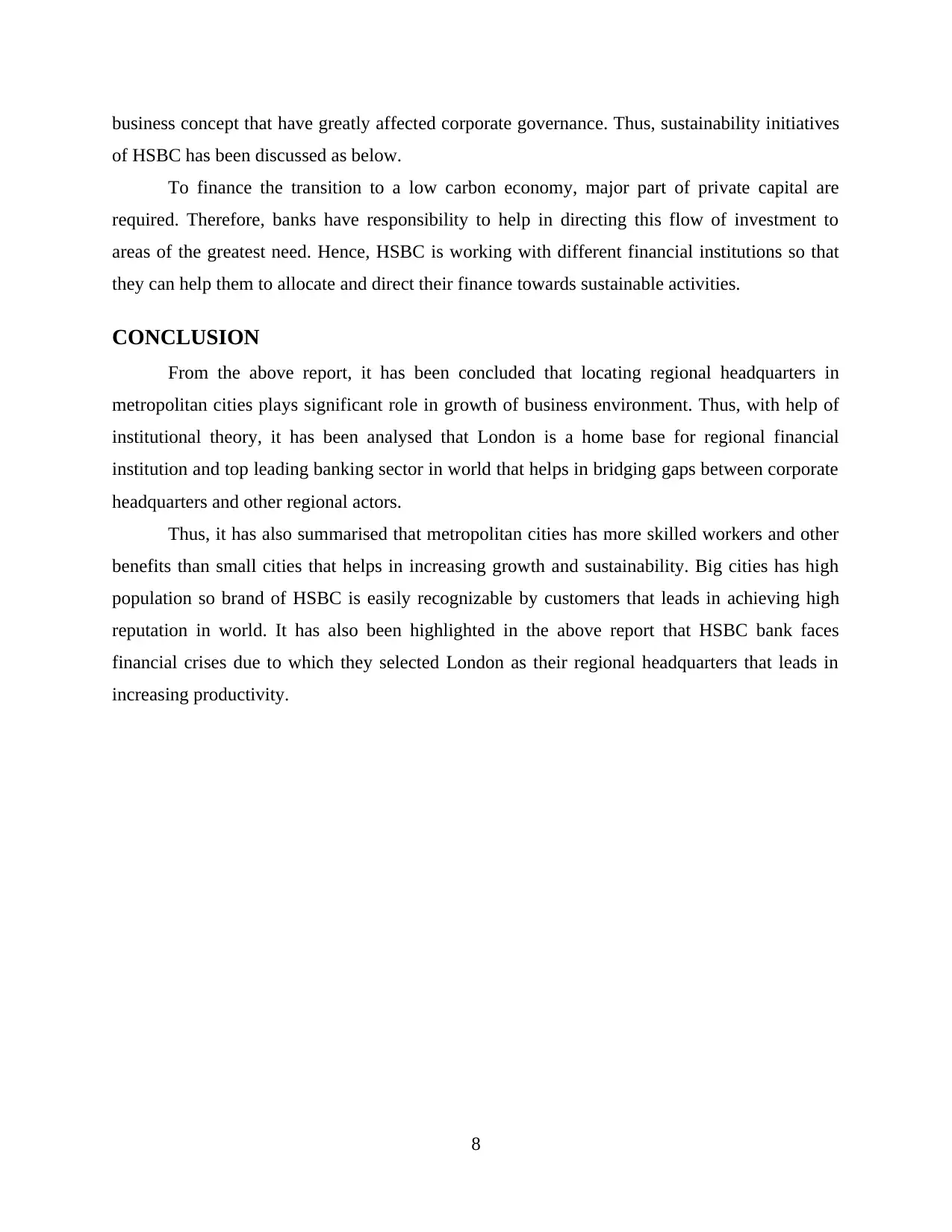
business concept that have greatly affected corporate governance. Thus, sustainability initiatives
of HSBC has been discussed as below.
To finance the transition to a low carbon economy, major part of private capital are
required. Therefore, banks have responsibility to help in directing this flow of investment to
areas of the greatest need. Hence, HSBC is working with different financial institutions so that
they can help them to allocate and direct their finance towards sustainable activities.
CONCLUSION
From the above report, it has been concluded that locating regional headquarters in
metropolitan cities plays significant role in growth of business environment. Thus, with help of
institutional theory, it has been analysed that London is a home base for regional financial
institution and top leading banking sector in world that helps in bridging gaps between corporate
headquarters and other regional actors.
Thus, it has also summarised that metropolitan cities has more skilled workers and other
benefits than small cities that helps in increasing growth and sustainability. Big cities has high
population so brand of HSBC is easily recognizable by customers that leads in achieving high
reputation in world. It has also been highlighted in the above report that HSBC bank faces
financial crises due to which they selected London as their regional headquarters that leads in
increasing productivity.
8
of HSBC has been discussed as below.
To finance the transition to a low carbon economy, major part of private capital are
required. Therefore, banks have responsibility to help in directing this flow of investment to
areas of the greatest need. Hence, HSBC is working with different financial institutions so that
they can help them to allocate and direct their finance towards sustainable activities.
CONCLUSION
From the above report, it has been concluded that locating regional headquarters in
metropolitan cities plays significant role in growth of business environment. Thus, with help of
institutional theory, it has been analysed that London is a home base for regional financial
institution and top leading banking sector in world that helps in bridging gaps between corporate
headquarters and other regional actors.
Thus, it has also summarised that metropolitan cities has more skilled workers and other
benefits than small cities that helps in increasing growth and sustainability. Big cities has high
population so brand of HSBC is easily recognizable by customers that leads in achieving high
reputation in world. It has also been highlighted in the above report that HSBC bank faces
financial crises due to which they selected London as their regional headquarters that leads in
increasing productivity.
8
Paraphrase This Document
Need a fresh take? Get an instant paraphrase of this document with our AI Paraphraser
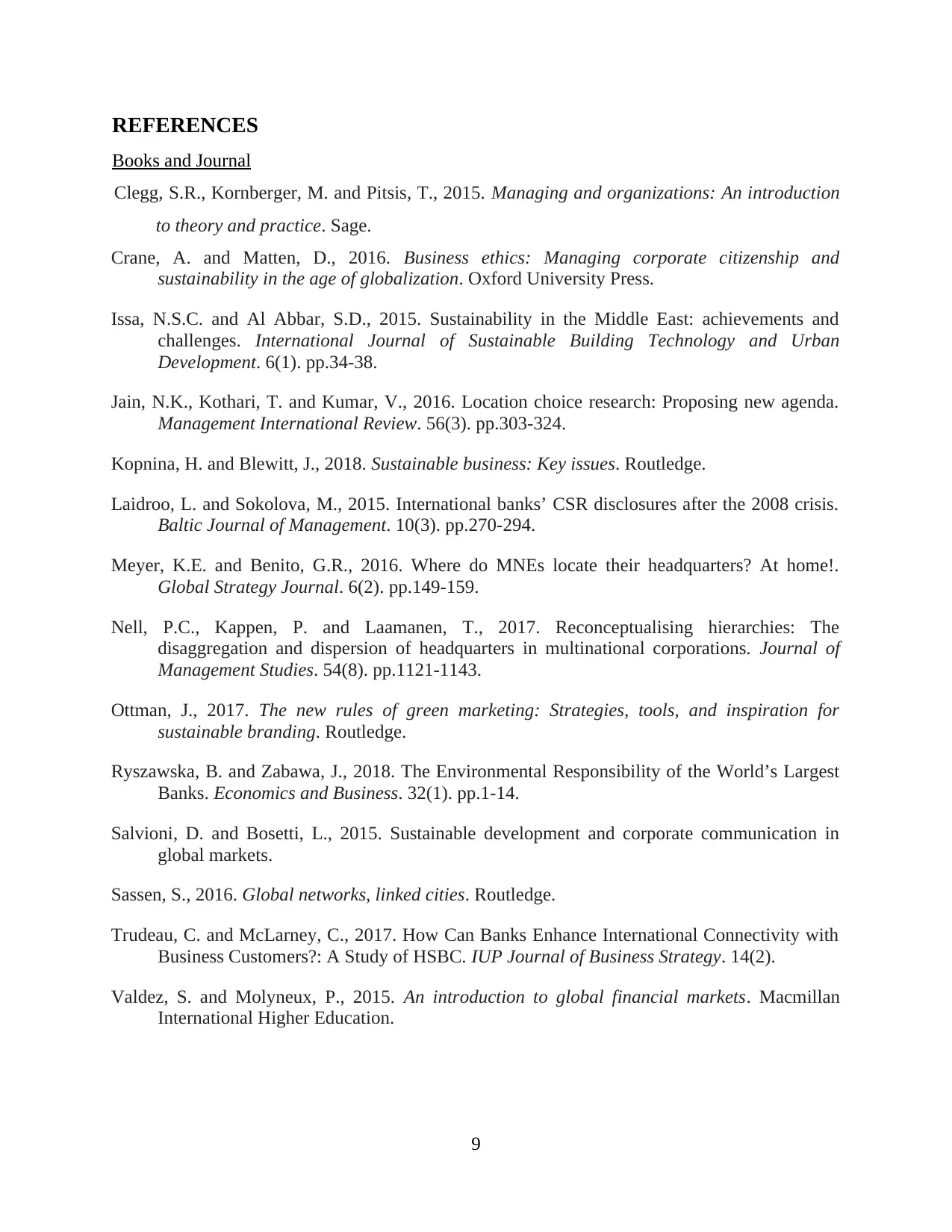
REFERENCES
Books and Journal
Clegg, S.R., Kornberger, M. and Pitsis, T., 2015. Managing and organizations: An introduction
to theory and practice. Sage.
Crane, A. and Matten, D., 2016. Business ethics: Managing corporate citizenship and
sustainability in the age of globalization. Oxford University Press.
Issa, N.S.C. and Al Abbar, S.D., 2015. Sustainability in the Middle East: achievements and
challenges. International Journal of Sustainable Building Technology and Urban
Development. 6(1). pp.34-38.
Jain, N.K., Kothari, T. and Kumar, V., 2016. Location choice research: Proposing new agenda.
Management International Review. 56(3). pp.303-324.
Kopnina, H. and Blewitt, J., 2018. Sustainable business: Key issues. Routledge.
Laidroo, L. and Sokolova, M., 2015. International banks’ CSR disclosures after the 2008 crisis.
Baltic Journal of Management. 10(3). pp.270-294.
Meyer, K.E. and Benito, G.R., 2016. Where do MNEs locate their headquarters? At home!.
Global Strategy Journal. 6(2). pp.149-159.
Nell, P.C., Kappen, P. and Laamanen, T., 2017. Reconceptualising hierarchies: The
disaggregation and dispersion of headquarters in multinational corporations. Journal of
Management Studies. 54(8). pp.1121-1143.
Ottman, J., 2017. The new rules of green marketing: Strategies, tools, and inspiration for
sustainable branding. Routledge.
Ryszawska, B. and Zabawa, J., 2018. The Environmental Responsibility of the World’s Largest
Banks. Economics and Business. 32(1). pp.1-14.
Salvioni, D. and Bosetti, L., 2015. Sustainable development and corporate communication in
global markets.
Sassen, S., 2016. Global networks, linked cities. Routledge.
Trudeau, C. and McLarney, C., 2017. How Can Banks Enhance International Connectivity with
Business Customers?: A Study of HSBC. IUP Journal of Business Strategy. 14(2).
Valdez, S. and Molyneux, P., 2015. An introduction to global financial markets. Macmillan
International Higher Education.
9
Books and Journal
Clegg, S.R., Kornberger, M. and Pitsis, T., 2015. Managing and organizations: An introduction
to theory and practice. Sage.
Crane, A. and Matten, D., 2016. Business ethics: Managing corporate citizenship and
sustainability in the age of globalization. Oxford University Press.
Issa, N.S.C. and Al Abbar, S.D., 2015. Sustainability in the Middle East: achievements and
challenges. International Journal of Sustainable Building Technology and Urban
Development. 6(1). pp.34-38.
Jain, N.K., Kothari, T. and Kumar, V., 2016. Location choice research: Proposing new agenda.
Management International Review. 56(3). pp.303-324.
Kopnina, H. and Blewitt, J., 2018. Sustainable business: Key issues. Routledge.
Laidroo, L. and Sokolova, M., 2015. International banks’ CSR disclosures after the 2008 crisis.
Baltic Journal of Management. 10(3). pp.270-294.
Meyer, K.E. and Benito, G.R., 2016. Where do MNEs locate their headquarters? At home!.
Global Strategy Journal. 6(2). pp.149-159.
Nell, P.C., Kappen, P. and Laamanen, T., 2017. Reconceptualising hierarchies: The
disaggregation and dispersion of headquarters in multinational corporations. Journal of
Management Studies. 54(8). pp.1121-1143.
Ottman, J., 2017. The new rules of green marketing: Strategies, tools, and inspiration for
sustainable branding. Routledge.
Ryszawska, B. and Zabawa, J., 2018. The Environmental Responsibility of the World’s Largest
Banks. Economics and Business. 32(1). pp.1-14.
Salvioni, D. and Bosetti, L., 2015. Sustainable development and corporate communication in
global markets.
Sassen, S., 2016. Global networks, linked cities. Routledge.
Trudeau, C. and McLarney, C., 2017. How Can Banks Enhance International Connectivity with
Business Customers?: A Study of HSBC. IUP Journal of Business Strategy. 14(2).
Valdez, S. and Molyneux, P., 2015. An introduction to global financial markets. Macmillan
International Higher Education.
9
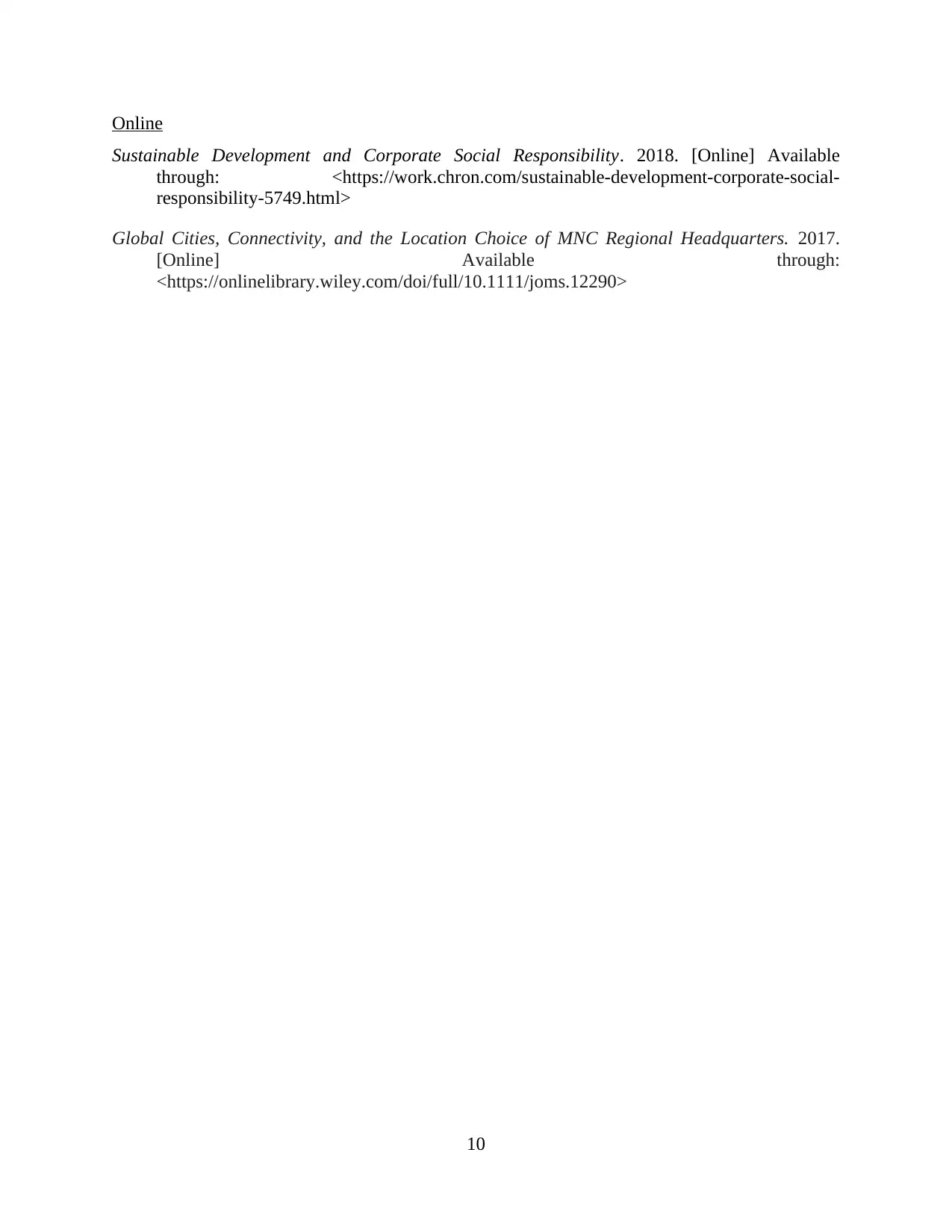
Online
Sustainable Development and Corporate Social Responsibility. 2018. [Online] Available
through: <https://work.chron.com/sustainable-development-corporate-social-
responsibility-5749.html>
Global Cities, Connectivity, and the Location Choice of MNC Regional Headquarters. 2017.
[Online] Available through:
<https://onlinelibrary.wiley.com/doi/full/10.1111/joms.12290>
10
Sustainable Development and Corporate Social Responsibility. 2018. [Online] Available
through: <https://work.chron.com/sustainable-development-corporate-social-
responsibility-5749.html>
Global Cities, Connectivity, and the Location Choice of MNC Regional Headquarters. 2017.
[Online] Available through:
<https://onlinelibrary.wiley.com/doi/full/10.1111/joms.12290>
10
⊘ This is a preview!⊘
Do you want full access?
Subscribe today to unlock all pages.

Trusted by 1+ million students worldwide
1 out of 13
Related Documents
Your All-in-One AI-Powered Toolkit for Academic Success.
+13062052269
info@desklib.com
Available 24*7 on WhatsApp / Email
![[object Object]](/_next/static/media/star-bottom.7253800d.svg)
Unlock your academic potential
Copyright © 2020–2026 A2Z Services. All Rights Reserved. Developed and managed by ZUCOL.




